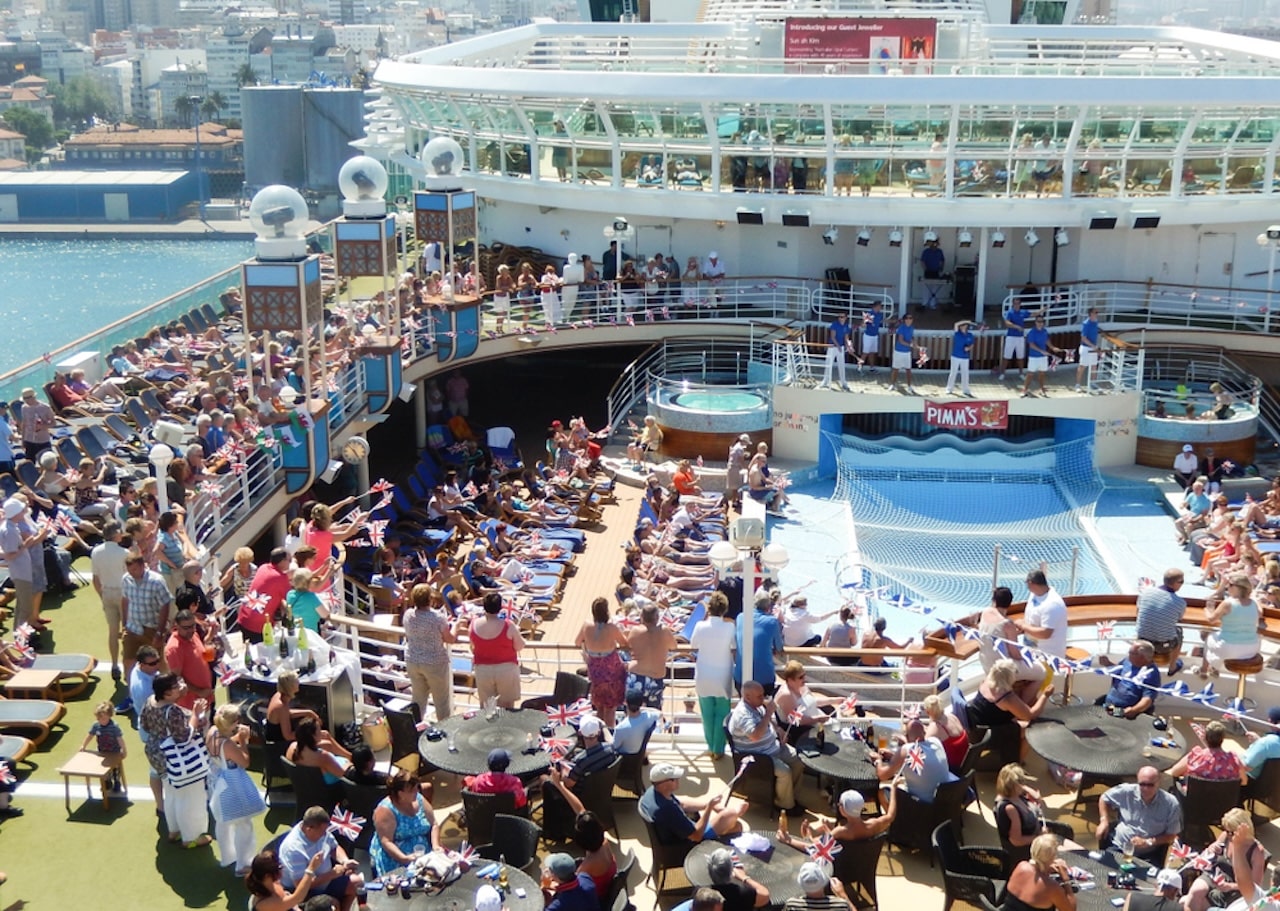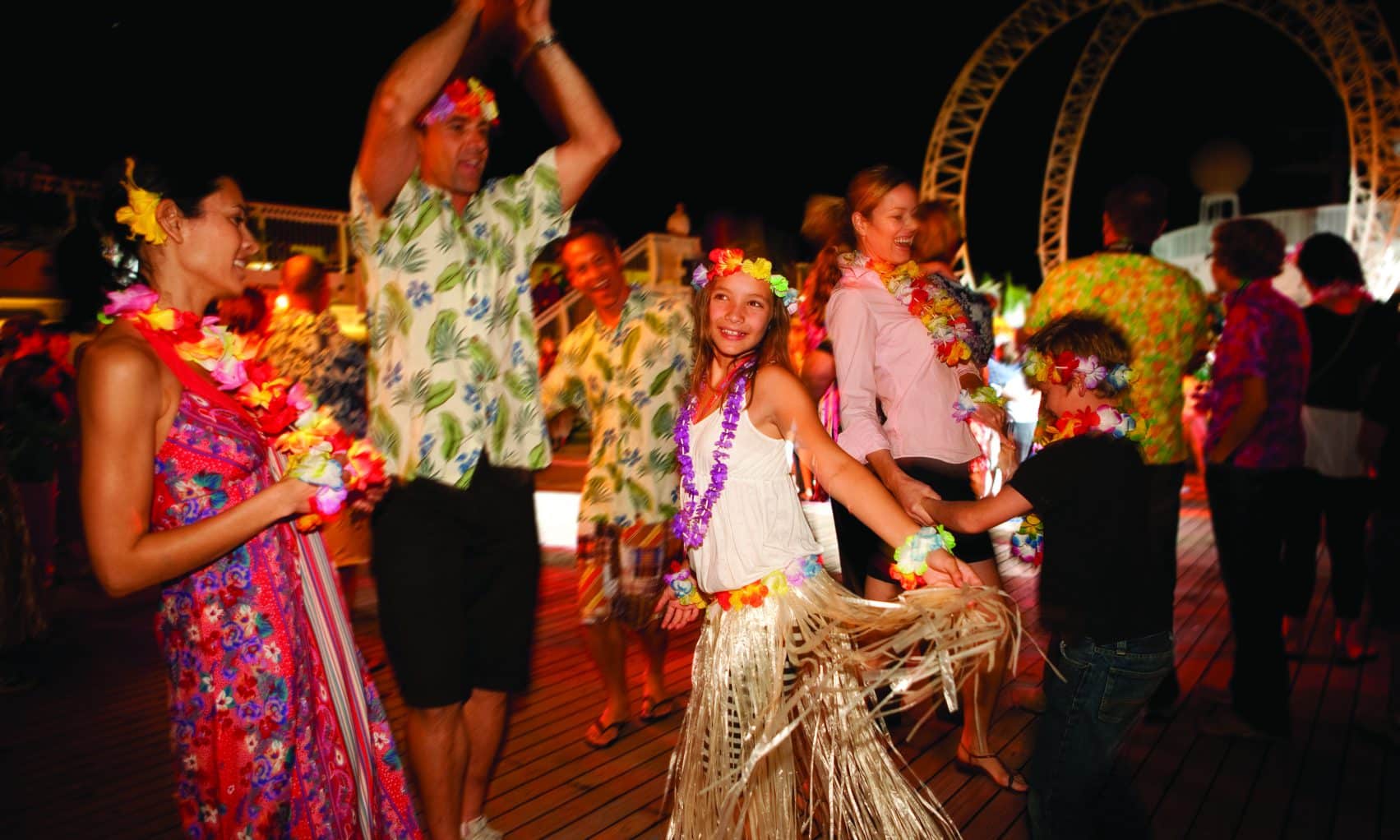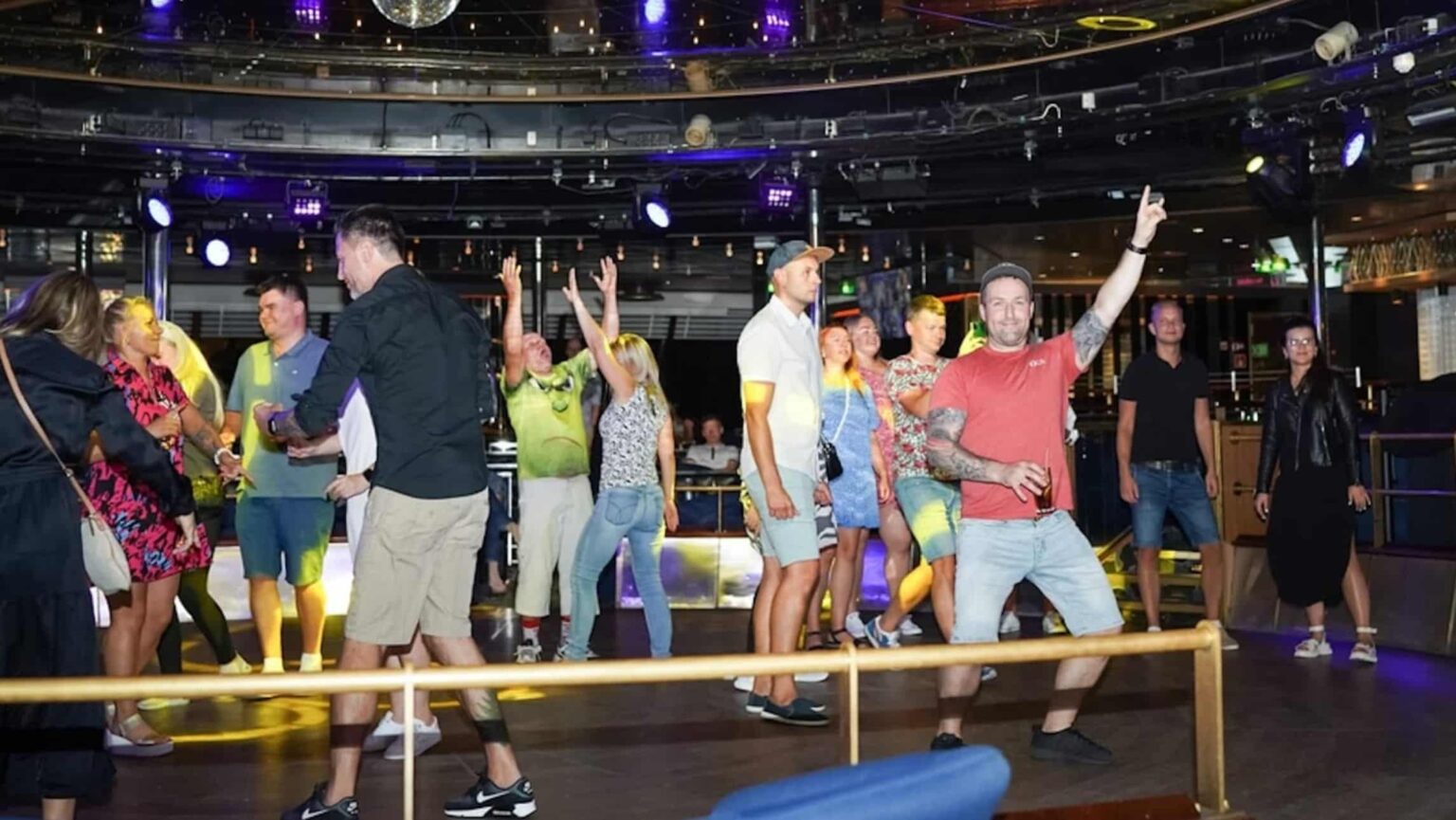- Cruise line bans are increasing, with Carnival Cruise Lines accused of banning hip hop music.
- Royal Caribbean has banned ducks from its onboard gardens.
- Are cruise lines’ rules over the top, of necessary as cruising becomes more popular and ship sizes grow?
Carnival Cruise Lines has come in for a lot of flack recently, after fans claimed the Fun Ships had banned rap and hip-hop music. Some commentators have even accused the line of being racist.
As usual, the line’s brand ambassador John Heald, had to field the questions. Also, as usual, his answers weren’t terribly helpful and evaded the real question.
“Because of the different musical tastes and interests of our guests, we are now extending themed nights in our nightclub venues and will play music that fits with the theme for the evening, including R&B, Dance & Pop hits, Blues & Funk, Latin & Soul, and 80s and 90s hits, rap, hip-hop, and Cleveland Ohio drum and bagpipe among others.”
One particular song was singled out by some cruise writers, Kendrick Lamar’s “Not Like Us”, a big hit which was number one in many charts was even played at half time at the American Super Bowl.
But as popular website Cruise Hive pointed out in a recent article: “three verses, two choruses, and final bridge have a total of roughly 900 words for the 4-minute, 34-second song. Of those words, six are the “f-word”, 17 are the “n-word”, six could be meaning a female dog, nine refer to something other than a donkey, and one is certainly not a cat.”
Not really in line with Carnival’s claim to be a family friendly line. But, as was pointed out, there were plenty of other hip hop songs that would fit that bill.
Major cruise lines, including Carnival Cruise Line, Royal Caribbean, Norwegian Cruise Line (NCL), and MSC Cruises, are increasingly implementing stringent rules and prohibitions that are subtly, yet significantly, reshaping the onboard experience.
While they all maintain the bans are important to ensure safety and enhance the overall guest experience, many are baffling, and point to increasingly intrusive policies that erode passenger freedom.
Why more rules?
It’s true that, where once cruise ships were more a mode of transport, today the vessel itself is often the primary destination.
Many are floating resorts packed with diverse amenities, dining options, and entertainment venues. This evolution means that cruise lines invest heavily in curating an immersive, enjoyable environment.
But sadly, not everyone plays by the rules – or even decent behavior.

Several key factors are driving the rash of new rules:
- Managing Disruptive Behavior: Cruise lines frequently cite an increase in unruly behavior as a primary catalyst for new policies. This includes incidents of loud music, excessive drinking, and public disturbances that have, at times, tarnished their brand reputations. Common frustrations like pool chair “hogging,” where passengers reserve lounge chairs with towels for extended periods, are also explicitly addressed by new rules, even if their enforcement remains inconsistent.
- Safety and Security: At the core of any maritime operation is passenger safety. Many prohibitions are rooted in fundamental security concerns, such as bans on firearms, weapons of any kind, ammunition, explosive substances, and certain high-risk electronics that pose fire hazards. These are generally understood and accepted as necessary for the well-being of all onboard.
- Brand Reputation and Rebranding Efforts: For some lines, like Carnival, the introduction of new policies is explicitly linked to efforts to “redefine its brand” and restore its reputation. This signifies a strategic move towards cultivating a “more controlled and respectful cruising experience”. The aim is to attract and retain a passenger base that aligns with this refined image.
Carnival Cruise Line: No noise please!

Carnival Cruise Line has been at the forefront of this policy shift, introducing a series of new regulations under the banner of “Have Fun. Be Safe.” These changes, intended to curb disruptive behavior and enhance the overall guest experience, have sparked considerable debate and controversy.
Among Carnival’s most notable prohibitions are:
- Bluetooth Speakers: Officially banned to prevent disturbances and noise pollution in public spaces, ensuring a peaceful atmosphere for all passengers. This ban, added in late 2024, also aims to ensure public safety announcements can be heard clearly.
- Handheld “Clack” Fans: Prohibited in nightclubs and any indoor dance floor citing safety concerns over the loud “clacking” sound and potential injuries in crowded areas.
- Marijuana/Cannabis: Carnival maintains a strict zero-tolerance policy. Marijuana, including cannabis and its derivatives, is strictly prohibited due to federal maritime law, regardless of its legality in a passenger’s home state. Violations can lead to immediate removal from the ship, a lifetime ban, potential fines, and even criminal charges.
- Curfew on young people: Guests aged 17 and under are now subject to a 1:00 a.m. curfew in public areas unless they are participating in a supervised youth program or accompanied by an adult. This policy, in place since 2022 or 2023, is seeing wider implementation and stricter enforcement.
- Age Restriction for Minors: A particularly stringent new policy requires guests wishing to bring a minor onboard to be at least 25 years old.
These policy changes have elicited strong reactions from passengers. There has been significant backlash, particularly from some Black passengers, who feel targeted and believe the rules are exclusionary or even racist. These individuals interpret the changes as Carnival’s attempt to “rebrand” and distance itself from a certain demographic, with some even canceling upcoming reservations in protest.
Other passengers have expressed support for Carnival’s stricter enforcement, viewing it as a necessary step to curb unruly behavior, address issues like pool chair hoarding, and restore the cruise line’s reputation.
Royal Caribbean: out for a duck?
Royal Caribbean, another major player, has also introduced specific restrictions, notably addressing a popular passenger pastime: hiding rubber ducks.
- Hiding Ducks in Central Park: Royal Caribbean has explicitly banned the hiding of “cruise ducks” in the live plants of Central Park on its Oasis and Icon Class ships. The rationale behind this seemingly innocuous ban is to protect the thousands of real plants and trees that comprise these lush onboard neighborhoods. Passengers, particularly children, were reportedly pushing, shoving, and trampling through the foliage in search of ducks, causing damage and requiring significant extra upkeep from crew members. Beyond Central Park, passengers are generally advised not to hide ducks in pools, hot tubs, or retail stores.
Royal Caribbean, like other lines, has a clear stance against chair hogging. Their official policy states that pool deck chairs are available on a first-come, first-served basis, and belongings left unattended for more than 30 minutes may be removed by crew members and taken to lost and found. However, passengers widely report that this policy is “rarely enforced” by staff, leading to continued frustration among guests.
Norwegian and MSC: No BYO

Norwegian Cruise Line (NCL) and MSC Cruises also maintain extensive lists of prohibited items and behaviors, many of which are common across the industry, reflecting a shared emphasis on safety and operational efficiency.
Common prohibited items across NCL and MSC include:
- Drones: Banned for the safety of guests and the welfare of the vessel, as well as privacy concerns.
- Firearms, Weapons, Ammunition, Explosives: Strictly prohibited for safety and security.
- Irons, Ironing Boards, Steamers, and other heating elements: These are consistently banned due to the significant fire risk they pose in cabins
- Alcoholic/Non-Alcoholic Beverages brough onboard: Generally prohibited, though NCL allows exceptions for wine and champagne with a corkage fee.
- Open Flames (Candles, Incense): Prohibited in cabins due to fire safety concerns.
- Various Electronic Devices: NCL bans large batteries, Emergency Position Indicating Radio Beacons (EPIRB), ham radios, satellite phones, transformers, lasers, and laser pointers. MSC also prohibits hoverboards due to their lithium-ion battery fire risk, and electrical extension cords.
- Animals: Only service or guide animals are permitted, and only with prior notification to the cruise line.
- Unsealed Food Items: NCL prohibits these. MSC goes further, prohibiting all outside food and drinks.
Are cruise ships creating nanny states?
The accumulation of these diverse prohibitions paints a clear picture: bans are indeed increasing and becoming more intrusive. Depending on how you look at them, they mean:
- Erosion of Spontaneity: The prohibitions on personal music devices like Bluetooth speakers and radios, the specific targeting of handheld “clack” fans (which are part of certain dance forms), and even the micro-management of activities like where one can hide a rubber duck, all chip away at the spontaneity and personal expression that many associate with a relaxed vacation.
- Increased Surveillance and Control: Curfews for minors and the strict new age restriction for guests bringing minors onboard suggest a heightened level of oversight.
- A loss of individual rights: Cruise lines frequently justify these rules by emphasizing the need for “community and neighborliness” and a “respectful and peaceful onboard atmosphere”.
Some bans are universally accepted for obvious reasons. The ban on weapons, illegal drugs, and items posing fire hazards are pretty obvious and fundamental to ensuring the well-being of thousands of people in a confined space.
However, the expansion into personal items like Bluetooth speakers and handheld fans, and seemingly innocuous activities like hiding rubber ducks could be seen as over-regulation. .
The evidence indicates that cruise line bans are increasing and becoming more intrusive. This trend extends beyond fundamental safety concerns to encompass personal items and behaviors, driven by safety imperatives, brand reputation management, and the challenges of managing shared spaces where thousands of guests congregate.
Operating massive floating cities requires a robust framework of rules to ensure the safety and comfort of all passengers. Unruly behavior, fire risks, and the need for operational efficiency are genuine concerns that necessitate regulation
Ultimately, passengers bear a responsibility to create a respectful and enjoyable environment for everyone. Responsible behavior and consideration for fellow travelers can significantly mitigate the perceived need for ever-stricter rules.
The future of cruising hinges on lines maintaining the allure of cruising as a liberating escape to the freedom of the open seas.
So where do you stand? Tell us what you think in the comments below.
.








Rules are fine, unless they’re deliberately aimed at making you pay the cruise lines inflated onboard prices. Preventing someone taking a couple of packets of potato crisps onboard, then offering them in the shop for 4 times the price is blatant gouging.
As an elite passenger with Princess our last cruise on the “Coral” came a close second to our world cruise on the “Oriana”.
The reason being the “Coral” is a smaller ship and the majority of passengers were elderly. Courtesy at the lifts etc needed to be seen to be believed. No one
Pushing you out of the way to gain access to areas, no one running around corridors at all hours. Crews cannot enforce rules that have already been set down so how are they going to enforce new ones..I fear cruising will never be the same as it has been in the past.
Rules have always been on public transport, which cruises are.
Just as times change, they have to be updated, which is what’s happening. Some impact those who don’t do anything wrong, but that’s what happens when some people don’t respect others – rules need to be added to prevent that.